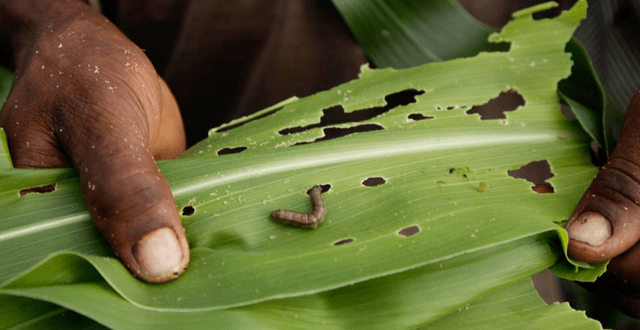At the first bi-annual Board Meeting held on 10th-11th July 2017 at the National Head office of the Peasant Farmers Association of Ghana (PFAG) in Accra, the Board Members of PFAG were concerned about the state of agriculture in the country. They were particularly concerned about the implementation of the Planting for Food and Jobs and the devastating effect of Fall Army Worm (FAW). The Association believe that, this could have dire consequences on the food security situation if emergency measures are not put in place to mitigate the effect. They observed that, earlier intervention by government looked promising, unfortunately however, the current situation indicates otherwise.
Members were therefore, particularly concerned about food security, hunger and the strategies adopted by government to address the menace so far on the FAW. The following were the conclusions on the FAW.
The situation
Food production in Ghana is threatened due to the FAW invasion on food crops, particularly maize. Answering questions on the floor of Parliament on behalf of the substantive Minister, one of his Deputy Ministers, Dr Sugri Bambangri, last week revealed that, currently, the FAW had spread to all the ten regions of Ghana. He mentioned that, the FAW was estimated to be affecting 112,812 hectares of farmlands with an estimated 14,430 hectares destroyed completely.
Even though these figures were unsubstantiated and alarming, the association believes that, the impact on agriculture could be underestimated due to the following reasons:
● Many farmers prepared their lands prior to the farming season but have to abandoned them for fear of FAW attack
● Many farmers who were yet to prepare their farms decided not to continue for fear of the FAW infestation. This has consequential effect on their livelihoods and contribution to national food security
● The situation is a potential demoralizing factor for the youth who are planning to take up farming
● The psychological effect on the victims and the impact on their other economic activities were all not valued
Even though government announced that GHS 15,857,280 has been released for the procurement of strategic insecticides (72,747 litres and 4,328 kilogrammes), training of staff on early detection, sensitization and awareness creation among others, this is far from addressing the problem.
PFAG is not impressed with the approach adopted by the Ministry to combat the situation. PFAG believes that, the public education is not reaching the most rural parts of the country where farmers are experiencing the effect and also pesticides supplied is not effective in killing the worms as some farmers have already resorting to the use of detergents to save their farms.
PFAG’s recommendations
● PFAG believes that, the situation is getting out of control hence, government should declare state of emergency to give the Minister and his Emergency Management Team more latitude to deal with the situation quickly.
● Government’s arrangement to combat the situation is commendable, but to ensure that the situation is brought under total control, PFAG suggests that, government should engage the research institutions to recommend the effective pesticides. Such pesticides should be 100% subsidized.
● All District Directors of Agriculture and the extension service officers should be resourced with emergency funds to move into farming communities for mass spraying exercise.
● The supply of subsidized agro chemicals arrangement failed to clearly indicate how the distribution was expected to be carried out having experienced smuggling and hoarding in the past, PFAG suggests that, a clear distribution procedure should be adopted and shared with all affected farmers.
● Since this is becoming an annual affair, adequate provision should be made in subsequent budget to cater for risk management and emergencies.
● Government should intensify monitoring and data collection of affected farms and make allocation in the 2018 budget for compensation
● PFAG suggests that, all available platforms including traditional and non-traditional media should be employed in the dissemination of information regarding how to deal with the situation by farmers.
Conclusion
The invasion of Fall Army Worm is a national food security threat that can affect the growth of Agriculture in Ghana, hence the need to declare state of emergency. Peasant Farmers Association of Ghana are ready to help government in ensuring that this invasion does not become an annual ritual and prepared to provide policy alternatives to ensure that, we become food sufficient.


leave a comment
You must be logged in to post a comment.